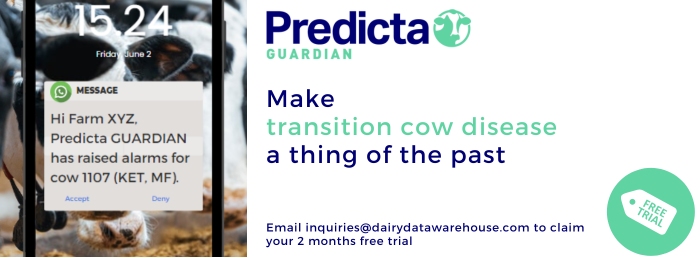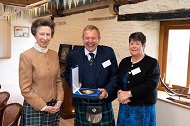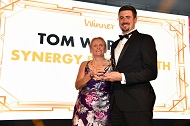|
|
|
|
|
Newsletter September 19, 2023
|
|
UK company takes national award for plastic-saving and carbon-reducing system for dairy hygiene products
 A system of re-using packaging for dairy hygiene materials and ensuring stream-lined and timely delivery of supplies has attracted a top innovation award. Part of the national dairy industry Cream Awards, the 2023 Award for Innovation went to Lancashire-based G Shepherd Animal Health.
A system of re-using packaging for dairy hygiene materials and ensuring stream-lined and timely delivery of supplies has attracted a top innovation award. Part of the national dairy industry Cream Awards, the 2023 Award for Innovation went to Lancashire-based G Shepherd Animal Health.
Vet Graham Shepherd, who founded the company in 2008, has been instrumental in developing a system for re-using barrel-type containers, for producing more concentrated dairy chemical and hygiene products and for more streamlined delivery on to dairy farms. Named Plasti-Save. "The system can achieve significant savings," says Dr Shepherd. "We're aiming for 20 re-uses from each plastic barrel, and delivering more concentrated products, where possible, reduces the transport of these materials."
The re-use of containers for the company's teat disinfectants, that promote cow udder hygiene, started in August 2021, followed by its concentrated BactoBAN dairy cleaning chemicals in September 2022. Dr Shepherd has piloted the scheme and carried out a study with the University of Central Lancashire (UCLAN) to ensure its effectiveness in re-use of packaging materials, and has shown a reduction in carbon use of 99% from re-using the packaging. "And at the end of its lifespan, the packaging material can be recycled," he adds. "We've also estimated that our concentrated plant cleaning chemicals can save 33% on package requirements and delivery mileage, which both contribute to a reduced carbon footprint inhte supply chain."
The company will add a remote level sensing technique for monitoring its chemical and hygiene product use on farm. This combines a sensor fitted to the rim of each container linked to a SIM card and app. which allows the company to monitor levels from its offices and arrange the delivery of supplies more effectively. "We can manage supplies and streamline our transport, and also ensure farmers have materials as required, helping to safeguard animal health and milk hygiene."
G Shepherd Animal Health quote the key benefits of its new Plasti-Save system as: Improved animal health and food quality (udder health, milk hygiene); nearly two tonnes less plastic per 1,000cows a year (equivalent to eight tonnes of CO2; approximately 33% less product volume required which reduces transport miles by 33%; more transport efficiency with improved delivery routes; improved farm cleanliness from less waste plastic.
The total plastic use for dairy chemicals on UK dairy farms is estimated to be 2,277 tonnes per year. The study at UCLAN shows just one re-use cycle saves more than 99% of the CO2. "We have estimated that by using more concentrated chemicals and re-using containers the plastic use for a 200-cow herd can be reduced by 395kg a year. On a national scale for 1.1million cows this equates to a reduction of 2,173 tonnes of plastic a year. This would be a significant and important contribution to reducing the carbon footprint in the UK dairy industry," says Dr Shepherd.
|
|
|
|
|
UK - Study shows bedding conditioner boosts cow health & cuts digital dermatitis
Research has shown using a once-weekly bedding conditioner treatment in dairy housing can reduce disease challenges and cut cases of digital dermatitis in dairy cows. An on-farm trial in France using bedding conditioner Cobiotex - available in the UK from EnviroSystems and manufactured by Dietaxion resulted in a significant reduction in both the number of cases and severity of digital dermatitis (DD) by 35% and 77%, respectively. The trial included 120 Holstein cows housed for part of the year in cubicles, treated with 200-250g of Cobiotex per cow per week in each cubicle for 12 months.
Cobiotex is a multi-strain bacterial additive that forms protective biofilms across animal bedding and cubicle surfaces. The biofilms work by outcompeting the growth of pathogenic bacteria, including those linked to mastitis (E coli, Staphylococcus, Streptococcus) and digital dermatitis (Treponema, Dicholeobacter), which reduces the risk of disease spread. At the start of the one-year trial, the farm had 36 cases of digital dermatitis per 100 cows, significantly higher than the typical average of around 21 cases/100 cows (AHDB 2021). However, by the end of the trial, the number of active cases of digital dermatitis had dropped from 36 to 24 cases per 100 cows, a significant improvement.
In addition, cases of digital dermatitis following the application of Cobiotex were more confined to less severe lesions (M1, M3, M4 stages) when scored using the M scoring system for digital dermatitis adopted by the International Committee for Animal Recording (ICAR). The proportion of cows in the painful M2 stages associated with severe lameness at the start and end of the trial reduced from 29 cases per 100 cows to 7, respectively.
Digital dermatitis is a highly contagious infection, usually affecting the skin on the bulbs of the heel and between the digits. It is widespread on UK farms and present in about 70% of herds1, with the disease more prevalent in housed herds. Contact with slurry is essential for the development of the condition. Nadis estimates the cost per case at between £75 to £81.49, making the annual cost per average farm roughly £3000 per 100 cows.
Commenting on the results the company's Managing Director Liz Russell said: "The results back up what we are seeing on farms here in the UK. Not only do farmers see health benefits in their cows, but the biologically-controlled bedding environment created when using the conditioner means that potentially 'irritating' bedding additives, such as lime, can be cut, and mastitis/digital dermatitis treatments or antibiotic use are also reduced."
EnviroSystems
|
|
|
UK - AHDB offers to help farmers to educate the next generation
AHDB is launching a pilot project to help farmers deliver high-quality, safe, and memorable on-farm experiences for school children. In collaboration with Linking Environment And Farming (LEAF) Education, 20 farmers from England and Wales will be offered fully funded training and support to deliver impactful school visits, help give more children the opportunity to experience a real working farm first-hand and better connect with where their food comes from.
Applications are open to farmers who are relatively new to hosting school visits within the Beef and Lamb, Cereals and Oilseeds, Dairy, and Pork sectors. Successful farmers will receive Countryside Educational Visits Accreditation Scheme (CEVAS) training and accreditation starting in November.
In addition, participants will gain access to the support of the LEAF Education Specialists and opportunities to network with like-minded experienced host farmers. Schools will also have access to funding towards transport, thereby addressing a key barrier to getting school children out on farm.
Roz Reynolds, AHDB's Head of Education, said: "We are excited to launch this pilot project as we believe it has the potential to make a real difference to the way that school children learn about where their food comes from."
"Levy payers picked education as one of the key areas of AHDB's work, following the Shape the Future results. AHDB is now actioning this and increasing opportunities for children to access and experience a real working farm first hand."
The findings gathered from this pilot project will help in shaping AHDB's future education projects and identifying whether a wider roll-out of the support package is a good return on levy investment.
"We are delighted to be partnering with AHDB on this important project," Carl Edwards, LEAF's Director of Education and Public Engagement added. "We believe that this project will help to equip farmers with the skills and knowledge they need to deliver engaging and informative experiential learning opportunities. This is essential in ensuring that the next generation understands and values food production from farm to fork."
Interested levy payers can access comprehensive details and submit their applications by visiting ahdb.org.uk/schoolfarmvisits. Deadline for submission is 16 October.
AHDB
|
|
|
UK - Bio-secure routes to market supporting GB Dairy Calf Strategy
An increased number of bio-secure routes to market for TB-affected herds has not only provided a lifeline for some producers of dairy-bred calves, but has also helped maximise values, while supporting the aims and priorities of the GB Dairy Calf Strategy. Through the support of the Livestock Auctioneers' Association (LAA), Approved TB Dedicated Sales (Orange Markets) represent an important marketplace for TB-affected herds, and according to Robert Venner of Sedgemoor Auction Centre, are producing tremendous results. "The orange markets in general are producing tremendous results for all cattle, with a diverse and solid trade. Although our calf numbers are relatively small, with between 20-50 through our orange markets, the sales produce much better results than vendors would face through forced sales on farm," he explains. Elsewhere, Frome Livestock Market initially focussed its orange markets on larger feeding cattle, prime cattle and cull cows. Driven by demand from dairy clients, it has now included a TB-restricted calf section on the same day. "This has become a valuable lifeline to dairy farmers who need to sell calves. The TB-restricted markets are also very useful for producers with a smaller quantity of calves on an all-year-round calving system, as they can bring any amount to the sale," explains Tom Rogers, Calf Auctioneer at Frome Market. One Somerset-based dairy herd manager explains, ''We have found the orange market to be a very useful outlet for calves during busier calving periods, when housing for dairy replacements must be prioritised."
Communication with vendors and buyers is paramount to selling all categories of livestock, and that has proved to be the key to the TB-restricted sales, according to Rogers. For example, with the current decrease in farmgate dairy prices, markets such as Frome have seen producers looking to maximise calf prices. Providing advice and guidance on how best to manage and present stock is key to helping achieve those prices. "Where possible, we encourage producers to focus on key aspects of calf management such as colostrum intake, time spent suckling a cow and presenting calves closer to 42 days of age to maximise the price achieved," he explains.
Conversations with the auctioneer or fieldsman are encouraged before calves are catalogued. This enables the market to not only manage vendor expectations, but also ascertain the type of calves, and relay that information to prospective buyers. By accurately describing the grade of calves, buyers can then plan to attend the sales relevant to them. This approach and two-way communication, works well for both producer and buyer alike.
LAA
|
|
|
Australia - Dairy industry to reduce food waste by 50%
Dairy is Australia's 3rd-largest rural industry, featuring 4,420 dairy farms and 455 processing factories across the country. In season 2021-2022, the total annual milk production was 8.55 billion litres, with 86% produced in south-east Australia. Through the development of the Action Plan, the industry has gained insights into where, what, and how much food waste is occurring and identified 10 key actions to reduce waste, reduce environmental impacts, and reduce costs.
There are currently 0.71 million tonnes of actual dairy food waste being generated across the dairy supply chain each year. Significant volumes of dairy food waste are being generated at the manufacturing, food service and household stages.
The highest proportion of dairy food loss is in those states that process the highest volumes of milk (Victoria, Tasmania and New South Wales). Cheese production is responsible for the largest dairy food waste volumes and is predominantly the result of whey (a by-product of cheese production) being discharged to sewer and land. Milk processing is also responsible for significant dairy food waste volumes, with the majority of this waste stream from finished product not being consumed, and then losses due to process wastes. Raw milk losses on farm are low compared to the rest of the supply chain.
It currently costs dairy manufacturers approximately AUD700 million (USD471m) per year to manage all potential food waste, with an additional AUD120 million (USD81m) of revenue lost from wasted finished products.
A key finding from developing the Action Plan has been the importance and ongoing need to consistently monitor dairy food waste and loss across the supply chain. A current challenge for the dairy industry is having a common metric for measuring and monitoring this dairy food waste, given the variability and range of dairy food products. The Dairy Food Waste Account reports that there are currently 0.71 million tonnes of actual dairy food waste being generated across the dairy supply chain.
Priority actions include investing in research and development and technical solutions for dairy manufacturing sites, implementing efficient inventory management systems to monitor and report on waste, partnering with food rescue organisations, promoting sustainable packaging solutions, and educating consumers through product labelling and storage advice-behaviour changes across the supply chain.
On farms, it is important to keep milk losses low and to quickly determine whether milk picked up early (at above 5°C) will meet the Food Standards Code and/or EU requirements. Targeted antibiotic use for cows, milk vat temperature sensors and generators to manage power outages, can also help to reduce losses.
The Action Plan was developed by Dairy Australia in collaboration with the Australian Dairy Products Federation and Stop Food Waste Australia, and with input from dairy businesses across the country.
DairyGlobal
|
|
|
UK - 'True icon' of dairy industry remembered at Cream Awards
 The great and the good of the UK dairy industry gathered in central London 7th September for the prestigious Cream Awards. One person sadly missing from this year's event was Ian Potter, the no-nonsense dairy sector journalist and commentator, who sadly and unexpectedly died earlier this year. Ian was a huge contributor to the British dairy sector, someone who had the interest of dairy farmers at heart and who gave opinions on prices, goings-on, and misconduct of the sector, reported through his own weekly dairy news bulletin.
The great and the good of the UK dairy industry gathered in central London 7th September for the prestigious Cream Awards. One person sadly missing from this year's event was Ian Potter, the no-nonsense dairy sector journalist and commentator, who sadly and unexpectedly died earlier this year. Ian was a huge contributor to the British dairy sector, someone who had the interest of dairy farmers at heart and who gave opinions on prices, goings-on, and misconduct of the sector, reported through his own weekly dairy news bulletin.
A farmer in this own right, Ian wore many hats throughout his lifetime, he became a milk quota broker in 1986, was a columnist for the Dairy Farmer magazine for more than 25 years and was instrumental in the running of the NFSC (National Fallen Stock Company). A larger-than-life character, Ian was known and respected across the industry, by producers and processors alike, for his level of knowledge and keen eye for detail, and his understanding of not only dairy businesses and their operations but the characters that made (and broke) them.
Ian was honoured for his hard work and dedication by being posthumously awarded The NFU Dairy Ambassador of the Year Award. NFU Dairy Board chair Michael Oakes, who presented Ian's family with the award, said: "The void Ian's passing has left is felt immensely within the farming community. It is fair to say that Ian wouldn't nod along and agree with those around him to appease anyone in a room - if Ian disagreed with you, rest assured you would know about it.
"Ian was a true icon in the dairy sector who has been described as at his happiest when fighting for the rights and causes of dairy farmers. The years of investment he poured into the industry will continue to be recognised for many years to come. Ian was not only our Dairy Ambassador of the Year but one of the most significant ambassadors of his generation. He will be missed."

Michael Oakes after presenting the award to Ian's son, Jack Potter and daughter, Lydia Clare at the Cream Awards 2023. Photograph: Cream Awards
'True icon' of dairy industry remembered at Cream Awards - NFUonline
|
|
| |
| |
|
|
|
Dairy Vitality Award Winner Announced
Sponsored by Wynnstay
WINNER Mark Lovatt, EA Lovatt & Son, of Sutton Lodge Farm
"A perfect example of adoption of technology combined with attention to detail that really does delivers results," said judges. "Healthy cows producing 44kg per day and 5,329 litres from forage is testament to high health status, again demonstrated by a pregnancy rate of 27%."
Image shows Mark Lovatt receiving his award from Head of Dairy Services at Wynnstay, David Howard.
HIGHLY COMMENDED: Charlotte West of Stocken Farm
COMMENDED: PJ Charles, Peter & Emma Charles of Mount Pleasant Farm
|
|
|
|
|
|
SRUC Research Farms Manager Hugh McClymont receives RABDF Princess Royal Award
Recently retired Hugh McClymont, was presented his Award, by Her Royal Highness The Princess Royal at Gatcombe Park. Presented to someone who has had an outstanding contribution to the sector, one of the highest accolades within the dairy industry. Hugh is known for his many roles: Chairman, and now incumbent Secretary, of 1000 Cow Club, Chairman of RHET Dumfries &Galloway Countryside Initiative (Royal Highland Education Trust), Chair (and only Scot to hold the position) of the Maize Growers Association and Chairman of the South West Scotland Grassland Society. RABDF
|
|
|
|
|
|
Young Dairy Vet of the Year Announced
Sponsored by Virbac
WINNER: Tom Warboys, Synergy Farm Health
"His customers speak very highly of him and his record of influencing change on farm is testament to his knowledge, empathy, and communication skills," said his Manager. "Customers talk about how knowledgeable, conscientious and caring he is, and how much they value him as part of their team."
Image shows Tom receiving his award from Eileen Bulloch, Farm National Sales Manager for Virbac
HIGHLY COMMENDED: Charlie Mays, LLM Farm Vets
|
|
BRITISH DAIRYING
ENSURE YOU RECEIVE EVERY COPY
British Dairying is available by subscription at £70.00 posted to UK addresses,
£90.00 for Europe, £115.00 for the Rest of the world
or £30 +VAT for British Dairying Online only
|
|
| |
QUOTE
"There is a harmony in Autumn, and a luster in its sky, which through the summer is not heard or seen, as if it could not be, as if it had not been."
Percy Bysshe Shelley
|
|
| |
|
|
|
You are receiving this email because you are a registered reader of British Dairying and we are pleased to send you extra information to supplement the journal.
|
|
|
|
|
British Dairying,
WB Publishing Ltd
Priory Cottage, Eastbourne Road Ridgewood East Sussex TN22 5ST
WB Publishing Ltd is registered in England and Wales, Registration No 2951727
|
|


 A system of re-using packaging for dairy hygiene materials and ensuring stream-lined and timely delivery of supplies has attracted a top innovation award. Part of the national dairy industry Cream Awards, the 2023 Award for Innovation went to Lancashire-based G Shepherd Animal Health.
A system of re-using packaging for dairy hygiene materials and ensuring stream-lined and timely delivery of supplies has attracted a top innovation award. Part of the national dairy industry Cream Awards, the 2023 Award for Innovation went to Lancashire-based G Shepherd Animal Health.

 The great and the good of the UK dairy industry gathered in central London 7th September for the prestigious Cream Awards. One person sadly missing from this year's event was Ian Potter, the no-nonsense dairy sector journalist and commentator, who sadly and unexpectedly died earlier this year. Ian was a huge contributor to the British dairy sector, someone who had the interest of dairy farmers at heart and who gave opinions on prices, goings-on, and misconduct of the sector, reported through his own weekly dairy news bulletin.
The great and the good of the UK dairy industry gathered in central London 7th September for the prestigious Cream Awards. One person sadly missing from this year's event was Ian Potter, the no-nonsense dairy sector journalist and commentator, who sadly and unexpectedly died earlier this year. Ian was a huge contributor to the British dairy sector, someone who had the interest of dairy farmers at heart and who gave opinions on prices, goings-on, and misconduct of the sector, reported through his own weekly dairy news bulletin.




